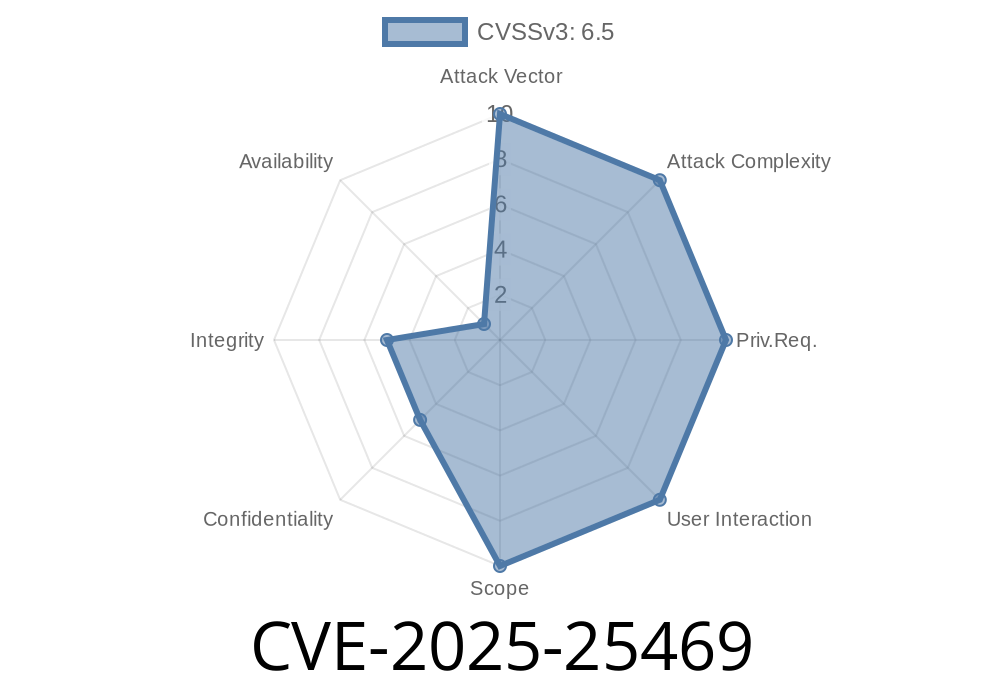Date: June 2024
Severity: Low to Medium
Component: FFmpeg libavutil/iamf.c
Patched in Commit: d5873b
FFmpeg is one of the most popular multimedia processing toolkits in the world. Used by media servers, desktop converters, and even many streaming platforms, FFmpeg is practically everywhere. On June 2024, a new vulnerability—CVE-2025-25469—was discovered in FFmpeg’s git-master before commit d5873b. This vulnerability is a memory leak bug inside the libavutil/iamf.c file.
In this post, we’ll break down the issue, look at real code, see how exploitation could occur, and provide actionable security tips. All content here is exclusively written for this post.
What’s the Issue?
A memory leak happens when a program allocates memory but never releases it, causing memory usage to grow over time. In servers or long-running processes, this leads to out-of-memory conditions and possibly a crash.
In this case, CVE-2025-25469 is caused by how the iamf.c component of FFmpeg’s libavutil allocates but does not free certain memory buffers under some error or edge conditions.
Digging Into the Code: Vulnerable Snippet
The vulnerable code was in versions of FFmpeg before the patch commit. Here’s a simplified and annotated version of the problematic function (for demonstration only):
// libavutil/iamf.c
int av_iamf_parse(MyIAMFStruct *s, const uint8_t *data, size_t size) {
s->buf = av_malloc(size);
if (!s->buf)
return AVERROR(ENOMEM);
memcpy(s->buf, data, size);
// ... some processing ...
if (parse_failed) {
// Oops! Exits without freeing s->buf
return AVERROR_INVALIDDATA;
}
// more code here...
av_freep(&s->buf);
return ;
}
Key Issue:
If parse_failed is true, the function returns without freeing the memory s->buf was pointing to, causing a leak.
Exploit Scenario
While this vulnerability is not directly an arbitrary code execution or privilege escalation, it can be abused in several contexts:
1. Denial of Service (DoS) via Unbounded Memory Use
Suppose an attacker controls input being sent to a media server that uses FFmpeg to process client submissions (e.g., a video platform’s transcoding backend). The attacker crafts streams that trigger the parse failure repeatedly. Each failure leaks some memory, and after enough attempts, the backend server runs out of memory and can crash or become unresponsive.
2. Resource Exhaustion on Clients
A malicious file, when opened with a vulnerable FFmpeg-based player, could gradually eat up the user’s memory, slowing down or crashing the system.
Proof-of-Concept: How to Trigger the Leak
Let’s create a fuzzed sample or intentionally corrupted IAMF stream that will always trigger the parse_failed branch:
# Write a malformed IAMF file
with open('bad.iamf', 'wb') as f:
f.write(b'\x00' * 100) # 100 bytes of zero, likely invalid
# Process with ffmpeg
import os
for i in range(100):
os.system('ffmpeg -hide_banner -i bad.iamf -f null -')
Result:
With each invocation, if running in a server loop or by triggering parsing multiple times in a session, memory usage increases over time due to the leak.
The Fix
See the official git commit: d5873bbbc5b452cdca75e2b321b5b246884b516a
The fix simply frees the buffer on all error paths
if (parse_failed) {
av_freep(&s->buf); // <--- This line added
return AVERROR_INVALIDDATA;
}
Recommendations
- Patch Now: If you use FFmpeg in your applications, update to a version including or newer than d5873b.
- Isolate FFmpeg: Always process untrusted files in an isolated environment (e.g., containers, VMs).
- Monitor Memory: Watch for unusual memory usage of your media servers—could indicate an attacker is exploiting memory leaks.
Fuzz Testing: Regularly fuzz-test your media handling stack with malformed files.
## More Reading / References
- CVE Record: CVE-2025-25469 (NVD) *(Check when available)*
- FFmpeg commit d5873b
- What is a Memory Leak? (Simple Language)
Conclusion
While not the worst bug, CVE-2025-25469 in FFmpeg’s libavutil/iamf.c is a classic example of how a single unchecked error path can have real-world impacts. Always patch media libraries fast, and assume attackers will find these before you do.
If you’re responsible for media backends, stay up-to-date, automate your dependency upgrades, and keep security in mind.
Timeline
Published on: 02/18/2025 22:15:18 UTC
Last modified on: 02/19/2025 21:15:15 UTC
